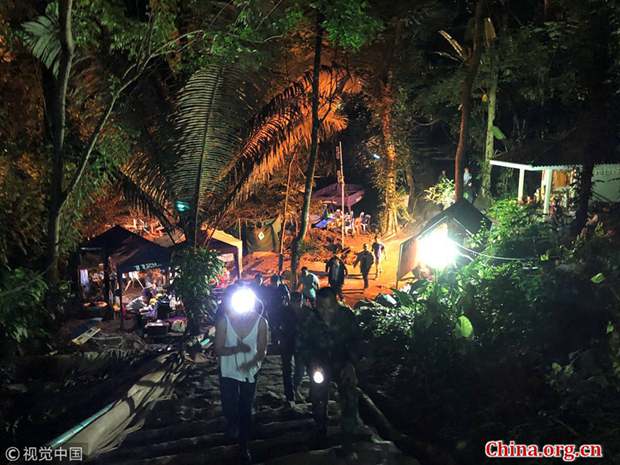?Rescue of Thai soccer players, coach: Lessons learned
- By Eugene Clark
 0 Comment(s)
0 Comment(s) Print
Print E-mail China.org.cn, July 17, 2018
E-mail China.org.cn, July 17, 2018

The world's attention was captured over the past 3 weeks by the saga and eventual successful rescue of 12 Thai youth soccer players and their coach from the Tham Luang cave system. What are some of the lessons to be learned from this extraordinary event?
First, it is a tribute to the rescuers, a team from all over the world, who gave of their expertise, time and attention to make this happen. Tragically, in the case of one Thai Navy Seal diver, that sacrifice involved giving his own life. Another of many examples is Dr Harris, an anaesthetist from South Australia. Harris swam into the cave with a Thai medical team to look after and assess the condition of the boys and their coach. It was Dr. Harris who administered a sedative to alleviate panic to each of the boys before they left the mountain cave ahead of the almost 2km swim to the surface. Sadly, Dr. Harris' own father died shortly after the competition of the successful rescue.
This rescue also demonstrates how modern technology, including rescue search and rescue practice, continues to advance. This ranged from modern medical advances, advances in communication and potential use of a small submarine.
Another element of this rescue operation was good luck, or as some would see it—answered prayers. The rains held off just in time, the operation ran efficiently, everyone cooperated. The pump system which reduced the water in the cave, stopped working just after the last people were out of the cave. While the rescue team had the benefit of some luck, this does not in any way detract from the great execution of the rescue.
Thailand deserves much credit in the way that the Thai authorities and Thai people pulled together and supported one another. It is also important to acknowledge the way everyone put their egos aside. The government is to be commended for its willingness to ask for and accept help from experts and other governments around the world. American and Chinese experts worked side by side. Muslims Thais from Southern Thailand provided meals. Jewish experts from Israel provided state-of-the art communications designed for caves. The boys' soccer coach starved himself and gave up food so boys could have more. He helped the boys keep calm and cope with the situation by teaching them meditations. Positive outcomes continue to flow from this rescue Those who donated tents for all the rescue team have given them to other needy groups. The Thai government will use this experience to add lights and sirens to the cave in order to protect future cavers.
The extensive international cooperation involved in this rescue should also be stressed. It is remarkable what can be achieved when humans and their governments cooperate with and support one another. As philosopher Bertrand Russell noted: "The only thing that will redeem mankind is cooperation." Indeed, leading biologists such as E. O. Wilson, argue that cooperation has been more important than competition in humanity's evolutionary success. Motivating this sense of altruism is the evolution of humanity's compassion. It is also important to realize the contribution of family values and humanities (poetry, music, drama, novels and the arts) to developing in our society a sense of compassion, altruism and empathy for others. While selfish people and even bullies may secure short-term wins, the ultimate winners in life are those who cooperate and are compassionate.
In this rescue attempt, everyone provided a helping hand. As Askhari Johnson Hodari puts it in Lifelines: The Black Book of Proverbs. "If everyone helps to hold up the sky, then one person does not become tired." The truth is that we humans are all family members of the human race. Accordingly, a major lesson to be garnered from this rescue is to serve as an important reminder that what we have in common is much greater than our differences. We are at our best and achieve the most when we cooperate rather than focus on differences in religion, gender, race, nationality, etc. As former President Dwight Eisenhower reminded us: "Though force can protect in emergency, only justice, fairness, consideration and cooperation can finally lead men to the dawn of eternal peace." Also, poet John Donne put it eloquently in poetry:
"No man is an island,
Entire of itself,
Every man is a piece of the continent,
A part of the main……
Any man's death diminishes me,
Because I am involved in mankind,
And therefore never send to know for whom the bell tolls;
It tolls for thee."
Finally, this wonderful and successful rescue should lead us all to a sense of gratitude for all of those who have positively impacted our lives. May we go forward to also lead lives in service of others. This point was stressed by Albert Einstein when he wrote;
"Strange is our situation here upon earth. Each of us comes for a short visit, not knowing why, yet sometimes seeming to a divine purpose. From the standpoint of daily life, however, there is one thing we do know: That we are here for the sake of other men —above all for those upon whose smile and well-being our own happiness depends, for the countless unknown souls with whose fate we are connected by a bond of sympathy. Many times a day, I realize how much my outer and inner life is built upon the labors of people, both living and dead, and how earnestly I must exert myself in order to give in return as much as I have received and am still receiving."
Eugene Clark is a columnist with China.org.cn. For more information please visit:
http://91dzs.com/opinion/eugeneclark.htm
Opinion articles reflect the views of their authors only, not necessarily those of China.org.cn.





